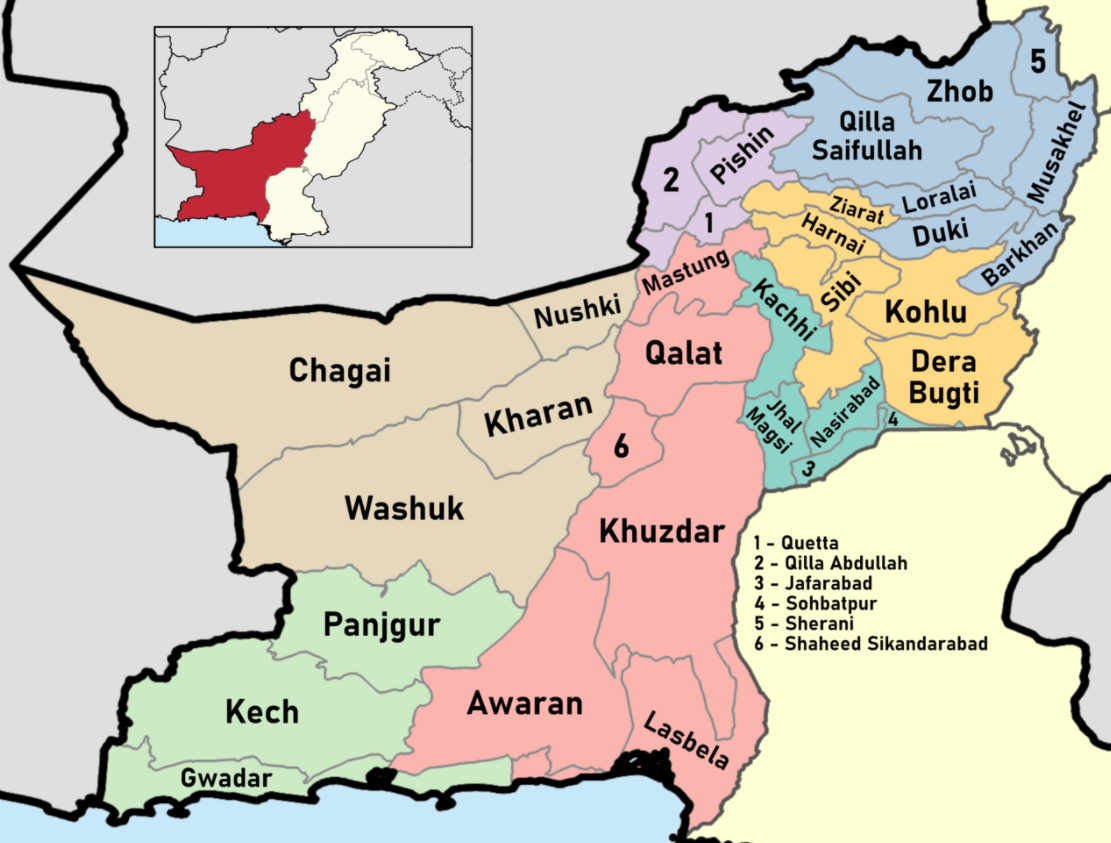
The districts of Balochistan province in Pakistan. [Source: Wikipedia]
by Muhammad Imran 8 April 2023
Balochistan, the largest province in Pakistan, has long been plagued by insecurity and instability. The province’s rugged terrain, tribal society, and resource-rich but impoverished conditions have contributed to a complex and protracted conflict that has persisted for decades. Addressing the underlying causes of instability in Balochistan requires a concerted effort from all stakeholders, including civil society, government, and institutions, through a collaborative dialogue process.
Dialogue is an essential component of any conflict resolution process. It is a process that allows the parties to understand each other’s positions, interests, and concerns, which can pave the way for finding a common ground and a mutually beneficial solution. In the case of Balochistan, the dialogue process can play a crucial role in addressing the province’s underlying causes of instability, including political, economic, social, and ethnic grievances.
In recent years, Pakistan’s government has initiated a dialogue process with Baloch separatist groups to address the grievances of the Baloch people. However, the dialogue process has been slow and fraught with challenges, including mistrust, lack of sincerity, and absence of inclusivity. A successful dialogue process requires the involvement of all stakeholders, including civil society, government, and institutions.
Civil society can play a critical role in promoting stability in Balochistan. Civil society organizations can mobilize communities, create awareness, and advocate for peaceful and inclusive solutions. Civil society organizations can also serve as a neutral platform for dialogue between conflicting parties, facilitating the process of reconciliation and trust-building. In the context of Balochistan, several civil society organizations have been working to promote peace and stability. For instance, the Balochistan Rural Support Program (BRSP) has been implementing various programs to improve the economic and social conditions of the people in Balochistan. Similarly, the Human Rights Commission of Pakistan (HRCP) has been documenting human rights abuses and advocating for their redressal.
The government also has a crucial role to play in promoting stability in Balochistan. The government must address the underlying grievances of the Baloch people, including political representation, economic development, and social justice. The government can initiate a process of policy reform that addresses these grievances and creates an inclusive and participatory political system.
In recent years, the Pakistani government has taken several steps to address the grievances of the Baloch people. For instance, the government has initiated a series of economic development projects in Balochistan, including the China-Pakistan Economic Corridor (CPEC). However, these projects have been criticized for their lack of transparency, consultation, and inclusion of local communities. Similarly, institutions also have a crucial role to play in promoting stability in Balochistan. Strong institutions, including the judiciary, law enforcement, and administrative bodies, can ensure that the rule of law is upheld, human rights are protected, and grievances are addressed through due process.
In the context of Balochistan, institutions have been weakened by a lack of resources, corruption, and political interference. The judiciary has been criticized for its lack of independence, while the law enforcement agencies have been accused of human rights abuses. Addressing these issues requires a concerted effort to strengthen institutions, improve their capacity, and ensure their independence. Ultimately, the success of any collaborative effort to bring stability to Balochistan will depend on the commitments made by all stakeholders. Without a genuine commitment to the process, the dialogue will be ineffective, and the underlying grievances will continue to fester.
All stakeholders, including civil society, government, and institutions, must commit to the process of dialogue and work towards finding a peaceful and inclusive solution to the conflict. This requires a willingness to listen to each other’s perspectives, to acknowledge past injustices, and to work towards a shared future. The commitment must also extend beyond the dialogue process to the implementation of the agreed-upon solutions. This requires a sustained effort to address the underlying grievances of the Baloch people through policy reform, economic development, and social justice.
Furthermore, the commitment must be backed by concrete actions that demonstrate the sincerity of the stakeholders. These actions could include the release of political prisoners, the restoration of basic rights, and the establishment of a framework for political participation and representation.
In conclusion, Balochistan’s long-standing conflict is a complex issue that requires a collaborative effort from all stakeholders to address. Dialogue is an essential component of this effort, providing a platform for conflicting parties to understand each other’s positions, interests, and concerns. However, the success of the dialogue process ultimately depends on the commitments made by all stakeholders to find a peaceful and inclusive solution to the conflict. Only through genuine commitment and sustained effort can Balochistan achieve stability and peace for its people.
